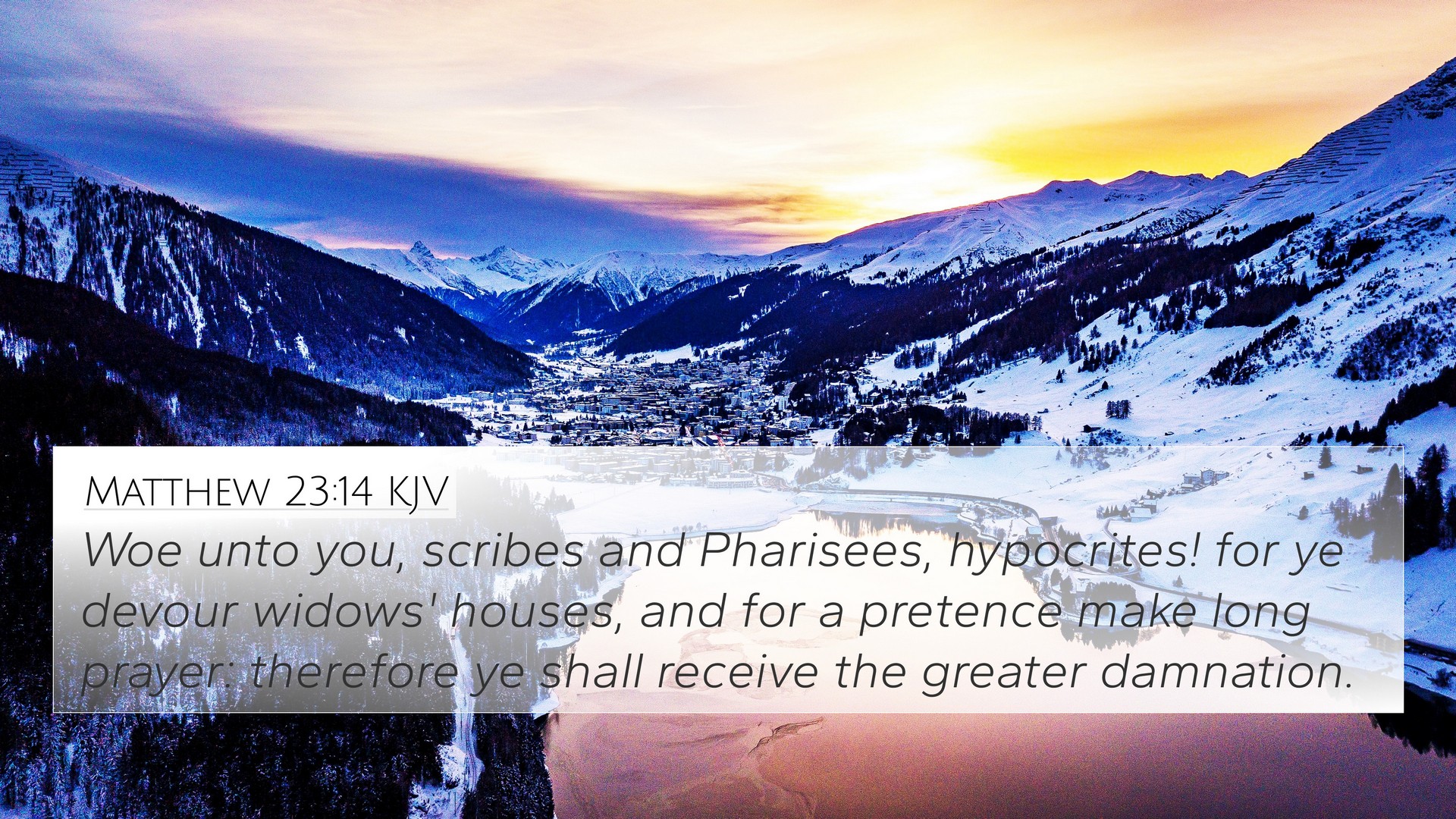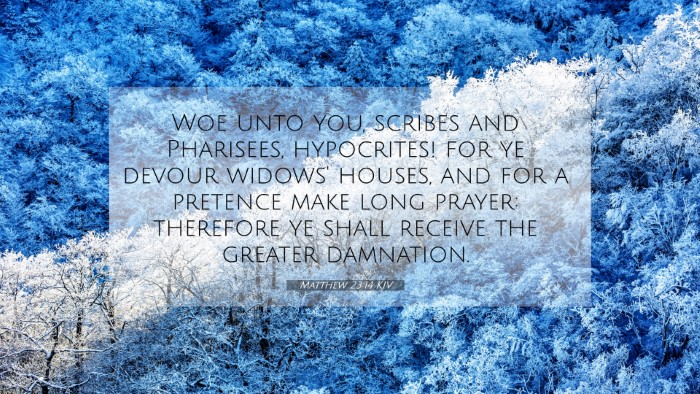Understanding Matthew 23:14
Matthew 23:14 states:
"Woe unto you, scribes and Pharisees, hypocrites! For ye devour widows' houses, and for a pretence make long prayer: therefore ye shall receive the greater damnation."
Overview
This verse is part of a series of denunciations by Jesus directed toward the religious leaders of His time, particularly the scribes and Pharisees. This condemnation focuses on their hypocritical actions and the severe consequences of their behavior.
Commentary Insights
- Matthew Henry: Matthew Henry emphasizes the weighty nature of Jesus' pronouncement. He notes that the religious leaders were exploiting the vulnerable, such as widows, for their own gain. The long prayers, while seemingly pious, were hypocritical measures masking their true intentions.
- Albert Barnes: In Barnes' interpretation, he highlights the contrast between outward appearances of righteousness and inner corruption. He discusses how their actions led not only to personal condemnation but also to societal corruption, as they discouraged true worship and reliance on God.
- Adam Clarke: Clarke adds that this verse illustrates the heart of religious hypocrisy—using piety as a facade for wrongdoing. He warns that such actions bring about not merely earthly judgments but divine retribution that is far more severe.
Bible Verse Cross-References
To deepen your understanding of Matthew 23:14, consider these cross-references that explore similar themes of hypocrisy, justice, and the treatment of the vulnerable:
- Isaiah 10:1-2: A warning against those who devise iniquity and write unjust decrees.
- Luke 18:11-12: The Pharisee's prayer exemplifies pride and self-righteousness in contrast to the humble publican.
- James 1:27: Highlights true religion, specifically caring for orphans and widows, showcasing the contrast to the actions of the scribes and Pharisees.
- Mark 12:40: Similar condemnation of scribes who devour widows' houses, again linking their behavior to their fate.
- Matthew 6:5-6: Jesus teaches about the hypocritical nature of public prayers, reinforcing the idea of authenticity in worship.
- Luke 11:42: Addressing the Pharisees and their failure to practice justice and love while focusing on minor ceremonial things.
- Romans 2:24: Paul refers to how God's name is blasphemed among the Gentiles because of the actions of His people, echoing the concerns raised in Matthew 23.
Connecting Themes in Scripture
This verse opens a discussion on the broader biblical themes of social justice, the true nature of religion, and God’s desire for genuine worship rather than hypocritical displays. These themes resonate throughout both the Old and New Testaments, offering a coherent narrative on God's expectations from His people.
Linking Bible Scriptures
As we analyze these connections, we can see how various scriptures act as a web of themes that reinforce each other:
- Social Injustice: Both Isaiah 10:1-2 and James 1:27 provide insight into God’s expectation to protect the vulnerable.
- Hypocrisy in Worship: Explore Matthew 6:5-6 and Luke 18:11-12 for contrasting motivations behind prayer and worship practices.
- The Consequences of Hypocrisy: Mark 12:40 complements Matthew 23:14 regarding the fate of those who misuse their spiritual authority.
Tools for Bible Cross-Referencing
To delve deeper into scriptural cross-referencing, consider using:
- Bible Concordance: A comprehensive tool for locating verses by keywords.
- Bible Cross-Reference Guide: Helps identify related scriptures and thematic connections.
- Cross-Reference Bible Study: Methods to discover links between verses through various studies.
Final Thoughts
Matthew 23:14 serves as a warning against the dangers of hypocrisy prevalent among religious leaders and invites believers to uphold genuine care and love for others, especially the marginalized. By utilizing cross-references and understanding the interconnectedness of biblical themes, one can gain a richer insight into the heart of Scripture and God’s ongoing call for righteousness.


